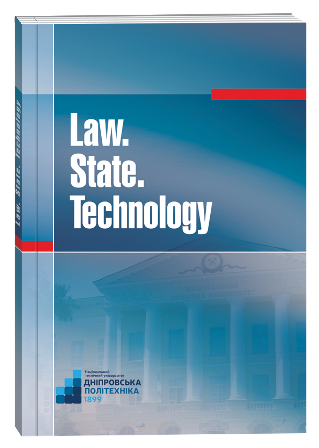EUROPEIZATION OF THE LEGAL REGULATION OF THE CREATION AND ACTIVITY OF REPRESENTATIVE BODIES OF STATE POWER IN UKRAINE IN THE CONDITIONS OF MODERN CONSTITUTIONAL REFORM
DOI:
https://doi.org/10.32782/LST/2025-1-1Keywords:
representative democracy, democracy, representative bodies, parliamentarism, President of Ukraine, Constitutional Court of Ukraine, europeisationAbstract
It is demonstrated that the European standards of governance and democracy that Ukraine seeks to implement focus mainly on reforming the parliament. This is due to the need to strengthen representative democracy and ensure effective legislative activity. In many European countries, the head of state performs mainly symbolic or ceremonial functions, which reduces the need for detailed recommendations on this institution. The focus is on the parliament as the key institution that determines the legislative and representative functions of the state, and therefore its reform is a higher priority in the context of improving governance and compliance with democratic standards. In general, the European Union bodies put forward a comprehensive reform of the formation and functioning of the Constitutional Court of Ukraine as one of the conditions for Ukraine’s membership in the EU. They consider it expedient to start this reform by regulating the role of the Head of State and other central public authorities in the selection of candidates for the positions of judges of the single body of constitutional jurisdiction. The European Commission fully agrees with the position of the Venice Commission, which makes its documents binding on Ukraine in this regard. The author identifies two main vectors of europeisation of relations between the President of Ukraine and the Constitutional Court of Ukraine: a) continuation of monitoring of all actions of the Head of State related to the formation of this body; b) replacement of the President of Ukraine in the process of appointment of judges of the Constitutional Court of Ukraine by the Verkhovna Rada of Ukraine. With regard to the first vector, it is noted that the constitutional reform measures are aimed at creating a clear system for the effective and independent selection of judges of the Constitutional Court of Ukraine. This should strengthen the credibility of the court, but requires close monitoring to prevent abuse and to uphold the principles of the rule of law and democratic governance. This is an important step towards fulfilling the conditions for Ukraine’s membership in the European Union.
References
Гораджаєв О. Я. Конституційні права і свободи людини і громадянина в країнах і міжнародно-правові стандарти : автореф. дис. … канд. юрид. наук. Одеса, 1998. 22 с.
Доповідь про правовладдя: Ухвалено Венеційською Комісією на її 86-му пленарному засіданні (Венеція, 25–26 березня 2011 року). URL: https://www.venice.coe.int/webforms/documents/default.aspx?pdffile=CDLAD(2011)003rev2-ukr
Дубас В. В. Вплив практики Європейської комісії «За демократію через право» на розвиток конституціоналізму в Україні: дис. ... доктора філософії в галузі права знань 08 «Право» за спеціальністю 081 «Право». Львів, 2022. 284 с.
Кондратенко О. Інститут Президента України: динаміка сфер компетенції. Політичні дослідження / Political Studies. 2023. № 1. С. 87–107.
Легеза Ю. О. Свобода та розумність як правові цінності сучасного цифрового європейського суспільства. Law. State. Technology. 2024. № 3. С. 9–13.
Мартинюк Р. Теоретико-правові підходи до визначення конституційно-правового статусу президента у змішаній республіці. Актуальні питання реформування правової системи України: Збірник наукових статей за матеріалами VІІ Міжнародної науково-практичної конференції, Луцьк, 2010 р., 4–5 червн.: Луцьк : Волинська обласна друкарня. 2010. Т. 1. С. 220–222.
Пояснювальна записка до Проекту Закону про відновлення суспільної довіри до конституційного судочинства, реєстр. № 4288 від 29 жовтня 2020 р. URL: https://w1.c1.rada.gov.ua/pls/zweb2/webproc4_1?pf3511=70282
Проект Закону про відновлення суспільної довіри до конституційного судочинства, реєстр. № 4288 від 29 жовтня 2020 р. URL: https://w1.c1.rada.gov.ua/pls/zweb2/webproc4_1?pf3511=70282
Савчин М. В. Інституційна спроможність під час і після війни. URL: https://zbruc.eu/node/116584?fbclid=IwAR2I83uiKhBF51au27PSavA5FWPYUK8XFZpkkgjVRl0ijAGb4tx5U1Xh1Zc
Чоудрі С., Седеліус Т., Кириченко Ю. Напівпрезиденціалізм та інклюзивне врядування в Україні: пропозиції для конституційної реформи. К.: Центр політико-правових реформ, 2018. 74 с.
Mishyna N. Decentralization: European court of human rights’ judgements implementation. Наукові праці Національного університету «Одеська юридична академія». 2023. № 32. Р. 94–99.
Mishyna N. V. Role of local and regional authorities in the implementation of ECtHR judgments: bibliographical review. Юридичний вісник. 2023. № 3. С. 146–151.
Qaracayev C. Axiological Function оf The Constitutional Court оf The Republic оf Azerbaijan. Juris Europensis Scientia. 2022. №3. C. 135–138.








